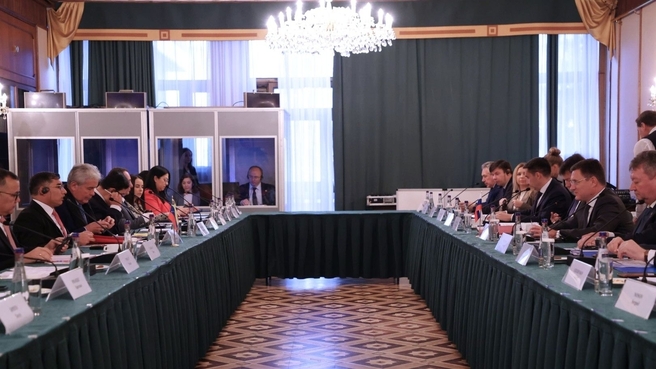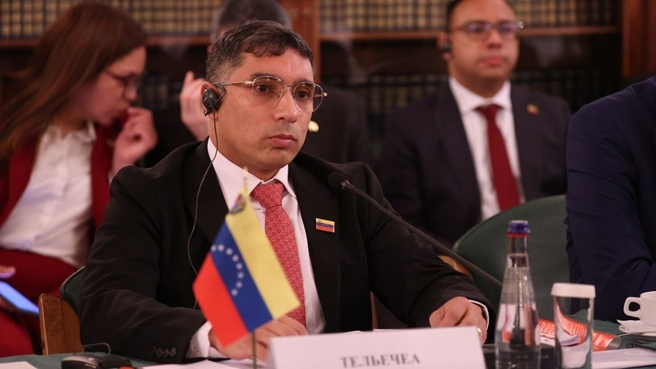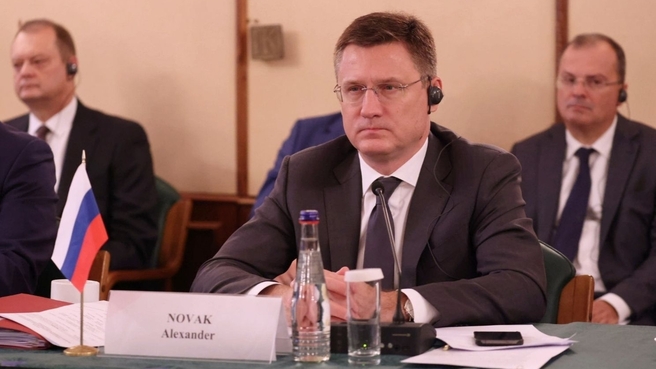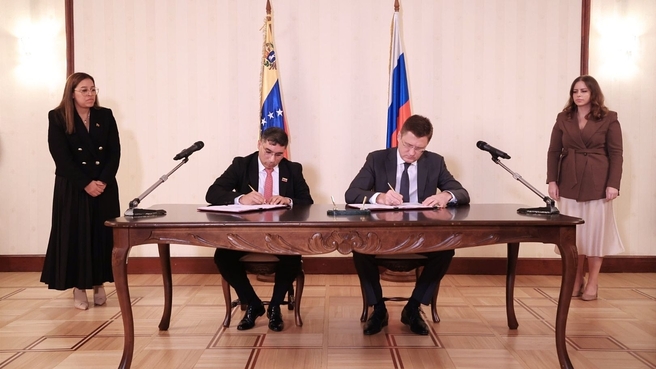Deputy Prime Minister Alexander Novak co-chaired the 17th meeting of the Russian-Venezuelan High-Level Intergovernmental Commission. The participants held restricted- and expanded-format talks and signed 16 bilateral documents on cooperation in oil and gas, oil servicing, tourism, maritime traffic, employment, media collaboration, science, and culture. They also discussed preparations for President Nicolas Maduro’s upcoming visit to Russia.
Alexander Novak noted Venezuela’s role as Russia’s key partner in Latin America, and welcomed its interest in participating in the work of BRICS. Russia and Venezuela are jointly working towards stabilising the global energy market, including in the OPEC+ format and the Gas Exporting Countries Forum. This is of particular importance against the background of Western countries’ attempts to use energy demand as a tool of political pressure.
During the first seven months of 2023, Russian-Venezuelan trade grew by 70 percent compared to the same period in 2022 and by 150 percent by volume due to a rise in fertiliser and soy oil exports. Russia and Venezuela are working to open reciprocal access to their markets for nearly 100 Russian and Venezuelan meat, fish, and milk product producers. The parties are also expanding cooperation in pharmaceuticals, including vaccine deliveries and localising the production of insulin in Venezuela with the participation of Russia’s Geropharm.
Alexander Novak stressed that cooperation between Moscow and Caracas has led to successes in culture, education and sports. In September 2023, they launched the Open Education Centre in Caracas, where anyone can take a course in Russian free of charge and become acquainted with Russian culture. Over 150 enrolment applications have been submitted.
“An important 2023 event was Russian participation in the 5th Sports Games of the Bolivarian Alliance for the Peoples of Our America (ALBA). We would like to note once again the high organisational level of the games and thank Venezuela for its hospitality and the opportunity it gave to Russian athletes to compete under their national flag and with Russia’s anthem, which is certainly a friendly gesture that we appreciate. The Russian Military Historical Society is planning to present Caracas with a bust of Alexander Pushkin, the founder of Russian national literature, which will be installed in one of the city’s oldest parks, Ezequiel Zamora Park. We welcome the Caracas city council’s resolution to name a garden in the park after this Russian poet. This event will highlight Russia’s contribution to world culture and the greatness of the Russian language, which is a means of communication for 300 million people all over the world,” Alexander Novak said.
Minister of People’s Power for Petroleum of the Bolivarian Republic of Venezuela Pedro Tellechea, who co-chairs the High-Level Intergovernmental Russian-Venezuelan Commission, welcomed the resumption of operations of the five PDVSA joint ventures and gas projects involving Gazprom.
“Venezuela appreciates Russian companies’ interest in expanding resource exchanges and exports related to oil, gas, and the petrochemical industry. After a number of productive working sessions, we note the outstanding efforts of the technical groups of both delegations, which were instrumental in signing the agreements that are now being implemented. Specifically, I am referring to personnel training. In a few days, Russia’s prestigious Gubkin Oil and Gas University will accept 40 young Venezuelans. In addition, Russian technology is helping us in geological exploration aimed at consolidating oil and gas reserves in Venezuela,” Pedro Tellechea said. Russian companies have expressed an interest in upgrading and building energy infrastructure in Venezuela, supplying equipment to transport oil and gas, and digitalising Venezuela’s oil and gas industry.
The two countries have agreed to increase the share of financial transactions in national currencies on foreign trade contracts. The Russian Mir card system is available in Venezuela. Direct air service has been established, with 65,000 passengers using it since the first flights began. Russian tourism to Margarita Island has increased significantly, and this tourist programme has become a year-round affair.
The two countries are developing cooperation in high-technology areas, primarily in peaceful space exploration. A project is under way to install a GLONASS station in Venezuela, which will make it possible for users to enjoy high-precision navigation in transport, agriculture, and construction of critical and complicated industrial and oil producing facilities.
The 18th meeting of the High-Level Intergovernmental Russian-Venezuelan Commission will be held in Caracas in 2024.















